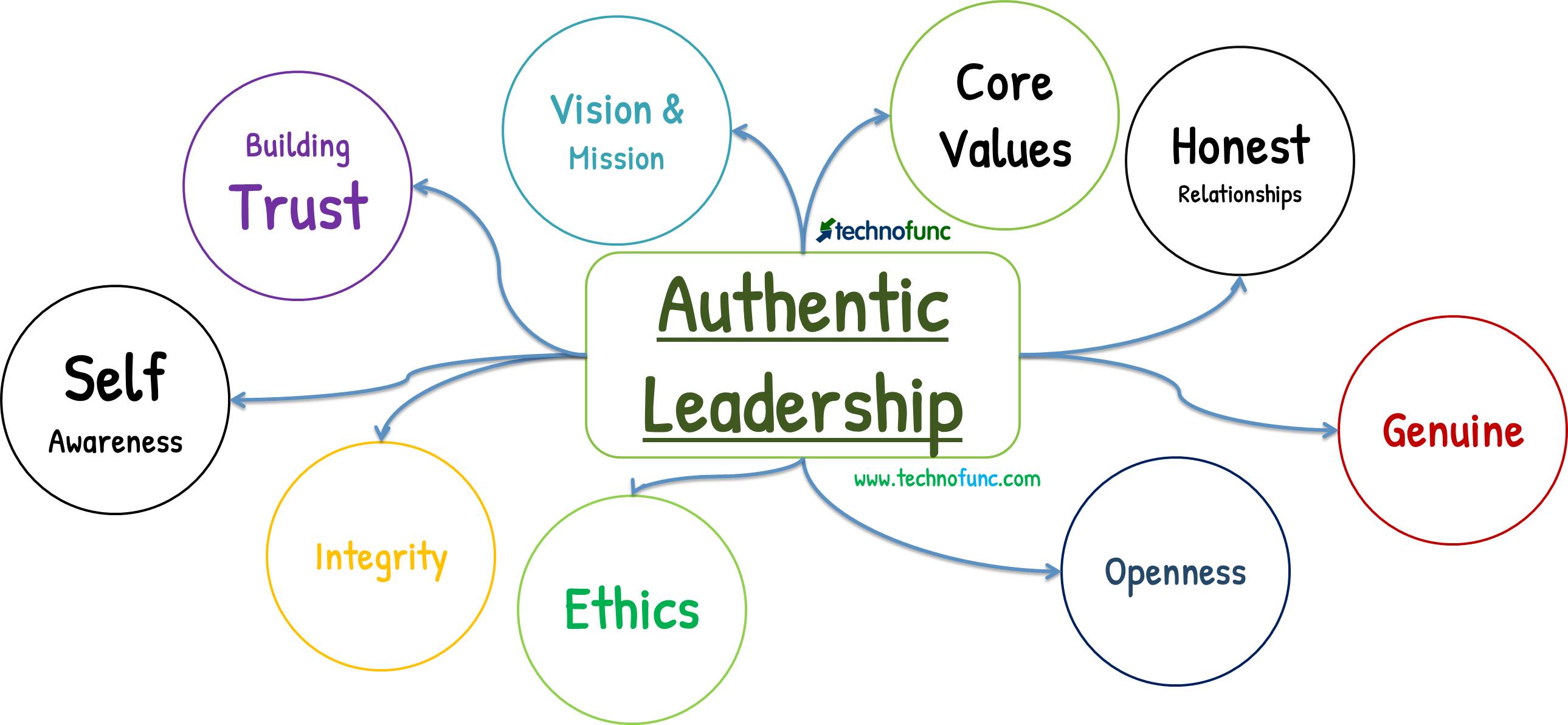
Authentic leadership is a new approach to leadership in which leaders are authentic, self-aware, transparent, build honest relationships, and work on an ethical basis. Authenticity is one of the core values of leadership. Authentic leaders have truthful self-concepts and they inspire by promoting openness by acting in a real, authentic, and sincere way. Authenticity requires self-awareness and the ability to act in accordance with one’s true self.
Authentic leadership is an approach to leadership that represents one of the newest areas of leadership research and is still in the development stage. It focuses on leadership, whether it is authentic and “real”. Authentic leadership is about the authenticity of leaders and their leadership. Today people demand trustworthy, honest and good leaders. The leadership approach emphasizes building leader legitimacy through honest relationships with followers that value their contribution and are built on an ethical foundation.
Authentic Leadership
Below are the three different perspectives for defining authentic leadership:
1. Intrapersonal perspective
- Focuses narrowly on the leader and what is happening within the leader
- Self-knowledge, self-regulation and self-image of the leader
- Authentic leaders demonstrate authentic leadership, lead by conviction, and are originals, not copies
2. Interpersonal perspective
- Authentic leadership is relational, created by leaders and followers together
- Results of leader effort and follower response
- Authenticity emerges from interactions between leaders and followers
3. Development outlook
- Authentic leadership can be nurtured
- Develops in people throughout life
- Can be triggered by major life events like a serious illness or a new career
What are the four components of authentic leadership?
The situational leadership model continues to evolve, but there seems to be a growing consensus on the following four distinct components of authentic leadership:
1. Self-awareness:
A continuous process of reflection and re-examination by the leader of his own strengths, weaknesses and values; a leader who is aware of his core beliefs is unlikely to stray from them. It involves knowing and acting on what is ‘true’ in yourself (authenticity), in your organization and in the world. The challenge for leaders is to distinguish between authentic and inauthentic actions, and then commit to authentic rather than inauthentic actions. Unless leaders know what is really going on, their actions will be inappropriate and can have serious consequences.
2. Relational transparency:
Open sharing by the leader of his or her own thoughts and beliefs, balanced by minimizing inappropriate emotions. Authentic leaders have the ability to open them up and connect with others and build strong relationships. They are willing to share their own story with others and listen to other people’s stories. Through mutual disclosure, leaders and subordinates develop a sense of trust and closeness. Authentic leaders are inspired and intrinsically motivated by their goals. They are passionate people who have a deep interest in what they do and genuinely care about their work.
3. Balanced treatment:
Balanced treatment is a leader’s solicitation of opposing points of view and an unbiased consideration of those points of view. It refers to the ability of an individual to objectively analyze information and explore the opinions of other people with the aim of taking them into account if they are deemed relevant, before making a decision. It also means avoiding favoritism on certain issues and remaining impartial when making decisions.
4. Internalized Moral Perspective:
The moral premise is that leaders should strive to do what is right. A positive ethical basis to which the leader adheres in his relationships and decisions and which resists external pressures. Authentic leaders have a very strong conviction about what to do. In the face of difficult situations, authentic leaders do not compromise their values, but rather use these situations to reinforce their values.

What are the characteristics of authentic leadership?
- Authentic leaders are positive people
- Authentic leaders have truthful self-concepts
- Authentic leaders foster openness by building trust and generating support
- Authentic leaders are able to improve individual and team performance
Who invented authentic leadership theory?
Ancient Greek philosophers emphasized authenticity by using the quote “Know thyself”. The concept originated in the 1960s to describe how an organization authentically reflects itself through leadership. Recently, authentic leadership has gained more attention among scholars and practitioners, but the concept is still in the early stages of evolution.
Why is authentic leadership important?
Authentic leadership is an effective leadership strategy because it has been shown to improve team performance. Authentic leadership has also been shown to promote trust in the group or organization, which results in increased loyalty to the organization, thereby increasing performance. Research into the mechanisms of authentic leadership is still ongoing, but it is becoming clear that authentic leadership leads to increased individual and team performance. Research has shown that authentic leadership impacts an employee’s job satisfaction, organizational commitment, and job happiness.
How to develop authentic leadership?
Authentic leaders have a genuine desire to serve others, know themselves, and feel free to lead from their core values. Authentic leaders understand their purpose and are passionate about their mission. They have developed strong values about the right thing to do and they work to build relationships and networks with others. They are self-disciplined and follow a values-based approach. One can develop authentic leadership by practicing and developing these concepts and traits. Leaders must focus on these characteristics to become authentic in their leadership style. Authentic leadership is a lifelong development process.
How to practice authenticity?
A leader’s life experiences and the meaning he or she attaches to those experiences are very critical to the development of the authentic leader. George listed five characteristics of authentic leaders that one should develop to practice authenticity. These five characteristics are Purpose, Values, Relationships, Self-Discipline, and Heart. He also suggests working on passion, behavior, connectedness, consistency, and compassion to become authentic leaders.
Who are the examples of the authentic leader?
A good example of an authentic leader who demonstrated passion for his goals was Terry Fox. Terry Fox was a national hero who inspired many other Canadians and taught us about cancer. He was a cancer survivor, whose leg was amputated after being defeated by bone cancer. Using a special prosthetic leg, Terry Fox set off on an east-to-west race across Canada, from the Atlantic to the Pacific, to raise awareness and funds for cancer research. the cancer. To produce his vision, he had to influence others by being the active agent of the change he wanted to see in others. He died before he finished his run, but also achieved his cancer awareness and fundraising goals for cancer research.
Related links
You might also like Team Leadership Theory | Theory Z of Management | Situational Leadership Model | Hawthorne Studies – Leadership | Taylor Scientific Management | Behavioral approach to management | Leadership attribution theory | Behavioral theories of leadership | Charismatic theory
